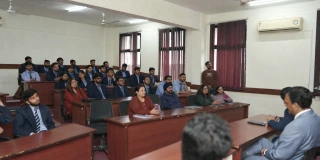A Program Tailored for Working Professionals and Full-Time Scholars
The M.Tech CSE / M.Tech CSE (by Research) program is an innovative postgraduate offering designed to cater to the aspirations of both working professionals and fresh graduates with relevant backgrounds. This program serves as an excellent opportunity for individuals looking to upgrade their qualifications through a structured blend of coursework and independent research.
Who Can Apply?
- Education Qualification: B.Tech. / B.E. in Computer Science/Computer Science & Engineering / Computer Engineering / Information Technology /Electronics and Communication Engineering /Electronics & Instrumentation Engineering / Instrumentation & Control Engineering/ Electrical Engineering/Electrical & Electronics Engineering or equivalent. Grad. IETE/AMIE (ECE/CSE/IT/EE). M.Sc. (IT/ Electronics/ Computer Science/Informatics/ Information Science & Technology/ Physics/ Mathematics/ Statistics/ Operation Research/Applied Physics) MCA or MCA (SE)
- Working Professionals :
- Should have secured minimum 65% marks or an equivalent CGPA in their undergraduate studies
- Must have a minimum of 2 years of working experience and should be in a full-time job at present.
- Full-Time Scholars :
- Required to have a minimum of 60% marks in their undergraduate program.
Program Highlights
- A 2-year (4-semester) curriculum emphasizing domain-specific knowledge, research skills, and thesis work.
- Designed to build a strong foundation in applied research, with a focus on solving real-world problems.
- Combines core courses, seminars, electives, and a major thesis project spread across two phases.
- Begins with a 3-week induction program (UHV-I) to help students align with institutional values and research orientation.
Outcomes and Opportunities
Graduates of this program will emerge as research-oriented professionals, equipped with the skills necessary to:
- Tackle complex engineering problems,
- Contribute to innovative product development, and
- Pursue Ph.D. or R&D roles in academia and industry.
This program is an ideal launchpad for professionals aiming for research-driven roles or those transitioning to advanced academic pursuits.
- * A pathway program for getting into Ph.D. with exemption in the coursework
- * The program will follow the same regulation as the Ph.D. program for assessment and delivery, including the role of DRC and SRC.
- * At least one subject in Sem 1 and Sem 2 will be offered through the Swayam Platform, which will be communicated to the students at the beginning of each semester.
- PEOs, PSOs, and POs for the M.Tech CSE / M.Tech by Research Program.
The Program Educational Objectives (PEOs), Program Specific Outcomes (PSOs), and Program Outcomes (POs) for the proposed M.Tech CSE / M.Tech by Research were presented and discussed in detail. The committee emphasized the importance of aligning these elements with national academic standards and global expectations in postgraduate technical education. The Board of Studies approved the proposed PEOs, PSOs, and POs for the M.Tech CSE / M.TechCSE by Research program and forwarding them to the Academic Council for final approval.
Program Educational Objectives:
PEO 1: Research Excellence: Student will develop strong research skills and contribute to solving real-world problems through original and high-impact research.
PEO 2: Scholarly and Professional Growth: Students will pursue doctoral studies, academic careers, or research and development roles in industry, contributing to the advancement of knowledge and technology.
PEO 3: Ethical and Interdisciplinary Leadership: Graduates will demonstrate leadership, ethical responsibility, and interdisciplinary collaboration in research and innovation for societal benefit .
Program Outcomes:
PO1: Research Competence: Conduct independent and systematic research to investigate complex problems and contribute to new knowledge creation.
PO2: Literature and Gap Analysis: Critically review existing literature, identify research gaps, and formulate research problems with well-defined objectives.
PO3: Methodological Rigor: Apply appropriate research methodologies, experimental techniques, or theoretical models to analyse problems effectively.
PO4: Technical Communication: Communicate research outcomes effectively through technical writing, conference presentations, and peer-reviewed publications.
PO5: Data Analysis and Interpretation : Use advanced tools, data analysis techniques, and statistical methods to validate research hypotheses and interpret results.
PO6: Innovation and Originality: Demonstrate creativity and originality in developing solutions or prototypes based on research findings.
PO7: Ethics and Responsibility: Apply ethical principles and adhere to responsible research practices, including proper citation, data integrity, and authorship ethics.
PO8: Collaborative Research: Work effectively as an individual and as part of multidisciplinary research teams, fostering collaboration and knowledge exchange.
PO9: Impact Assessment: Evaluate the social, environmental, and technological impact of research outcomes on stakeholders and policy.
PO10: Lifelong Learning: Engage in continuous learning and stay updated with the latest research trends, technologies, and professional practices.
Program Specific Outcomes
PSO 1: Research Planning and Execution: Design and execute a research plan using advanced tools and methods, from proposal writing to thesis submission.
PSO 2: Publication and Dissemination: Publish quality research papers in reputed journals and conferences, and contribute to knowledge dissemination.
PSO 3: Industry and Societal Relevance: Develop research solutions that address contemporary challenges in industry or society, demonstrating translational value.
-
Course Structure
-
| S. No. |
Course Title |
| 1 |
Research Methodology & Experimental Design |
| 2 |
Applied Machine Learning |
| 3 |
Advanced Data Structure and Algorithms |
| 4 |
Technical Communication & Academic Writing |
| 5 |
Seminar I (Literature Survey + Presentation) |
| S. No. |
Course Title |
| 1 |
Domain-Specific Elective I |
| 2 |
Domain-Specific Elective II |
| 3 |
System Simulation |
| 4 |
Seminar II (Problem Statement + Design) |
| 5 |
University Elective (Open Elective) - 1 |
| S. No. |
Course Title |
| 1 |
M.Tech Thesis Phase I (Proposal, Design, Initial Results) |
| 2 |
Progress Seminar & Peer Review |
| S. No. |
Course Title |
| 1 |
M.Tech Thesis Phase II (Implementation, Analysis, Defense) |
| 2 |
Final Presentation & Viva Voce |
| |
Domain Specific Elective - I |
| |
Subjects |
| |
AdHoc Networks (GNS3) |
| |
Machine Learning |
| |
Cryptography and Network Security |
| |
IoT |
| |
Data Engineering |
| |
Deep Learning |
| |
Domain Specific Elective - II |
| |
Subjects |
| |
Front End UI/UX development |
| |
Backend frameworks (Server side scripting) |
| |
Javascript farmeworks (Angular/React) |
| |
Embedded Systems |
| |
Big Data |
| |
DevOps |
| |
Domain Specific Elective –AI/ML |
| |
Introduction to Artificial Intelligence & Machine Learning |
| |
Machine Learning & Deep Learning |
| |
Prompt Engineering |
| |
Application of Machine Learning in Industries |
| |
Computational Linguistics and Natural Language Processing |










































































